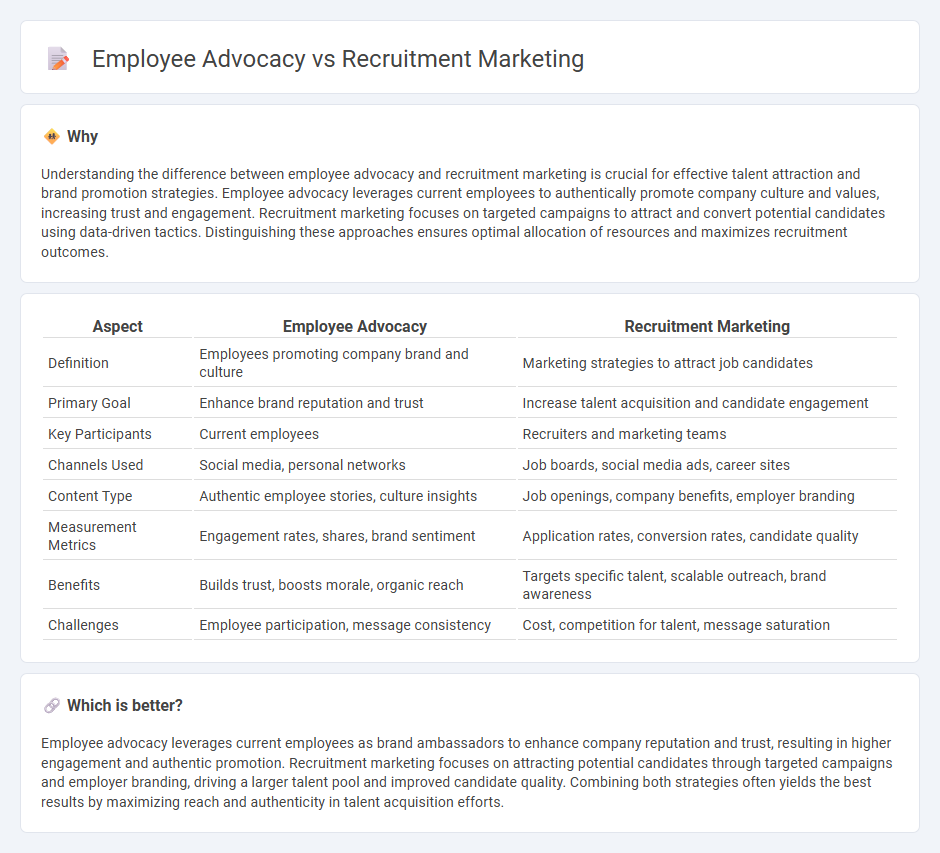
Employee advocacy leverages current employees to authentically promote a company's brand, enhancing trust and engagement through genuine personal experiences. Recruitment marketing focuses on attracting potential candidates by showcasing employer value propositions and targeted campaigns to build a strong talent pipeline. Explore the key differences and benefits of both strategies to optimize your talent acquisition approach.
Why it is important
Understanding the difference between employee advocacy and recruitment marketing is crucial for effective talent attraction and brand promotion strategies. Employee advocacy leverages current employees to authentically promote company culture and values, increasing trust and engagement. Recruitment marketing focuses on targeted campaigns to attract and convert potential candidates using data-driven tactics. Distinguishing these approaches ensures optimal allocation of resources and maximizes recruitment outcomes.
Comparison Table
| Aspect | Employee Advocacy | Recruitment Marketing |
|---|---|---|
| Definition | Employees promoting company brand and culture | Marketing strategies to attract job candidates |
| Primary Goal | Enhance brand reputation and trust | Increase talent acquisition and candidate engagement |
| Key Participants | Current employees | Recruiters and marketing teams |
| Channels Used | Social media, personal networks | Job boards, social media ads, career sites |
| Content Type | Authentic employee stories, culture insights | Job openings, company benefits, employer branding |
| Measurement Metrics | Engagement rates, shares, brand sentiment | Application rates, conversion rates, candidate quality |
| Benefits | Builds trust, boosts morale, organic reach | Targets specific talent, scalable outreach, brand awareness |
| Challenges | Employee participation, message consistency | Cost, competition for talent, message saturation |
Which is better?
Employee advocacy leverages current employees as brand ambassadors to enhance company reputation and trust, resulting in higher engagement and authentic promotion. Recruitment marketing focuses on attracting potential candidates through targeted campaigns and employer branding, driving a larger talent pool and improved candidate quality. Combining both strategies often yields the best results by maximizing reach and authenticity in talent acquisition efforts.
Connection
Employee advocacy leverages satisfied employees to promote company culture and job opportunities, significantly enhancing recruitment marketing efforts. This synergy increases employer brand visibility and attracts high-quality talent through authentic, trusted voices. Businesses that integrate employee advocacy in recruitment marketing experience higher candidate engagement and reduced hiring costs.
Key Terms
**Recruitment Marketing:**
Recruitment marketing leverages targeted employer branding, strategic content creation, and data-driven campaigns to attract top talent by showcasing company culture and opportunities across multiple channels. It employs advanced analytics to optimize candidate engagement and improve hiring outcomes, focusing on outreach through social media, job boards, and career websites. Explore effective recruitment marketing strategies to enhance your talent acquisition process today.
Employer Branding
Recruitment marketing leverages strategic campaigns to attract top talent by showcasing the company's culture and opportunities, while employee advocacy empowers current staff to authentically promote the employer brand, enhancing credibility and reach. Both strategies intertwine to strengthen employer branding through consistent messaging across multiple channels, boosting candidate engagement and retention rates. Explore how integrating recruitment marketing with employee advocacy can transform your employer branding efforts for greater impact.
Talent Pipeline
Recruitment marketing targets potential candidates through branding and outreach strategies to attract top talent and build a robust talent pipeline. Employee advocacy leverages current employees to share authentic company experiences, enhancing employer reputation and increasing candidate trust. Discover how integrating these approaches can strengthen your talent pipeline effectively.
Source and External Links
Recruitment Marketing Guide: Everything to Build Your Strategy - Recruitment marketing involves proactive and reactive strategies that help organizations attract, engage, and nurture talent--both externally and internally--before a role needs to be filled by focusing on building a strong candidate experience throughout the recruitment funnel.
Recruitment marketing - Wikipedia - Recruitment marketing refers to inbound strategies that organizations use to find, attract, and engage potential candidates using digital tools, optimized career sites, social media, and personalized content, aiming to build and maintain an active talent pipeline rather than simply filling immediate vacancies.
What is Recruitment Marketing: Definition and Benefits - Recruitment marketing is the process of promoting an employer's brand to attract, engage, and build relationships with qualified talent throughout the recruitment cycle, encouraging more candidates to apply and fostering a positive perception of the company as a desirable place to work.
 dowidth.com
dowidth.com